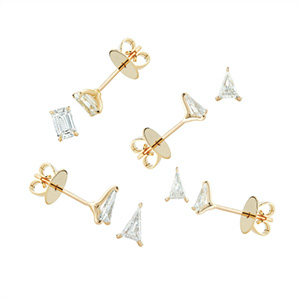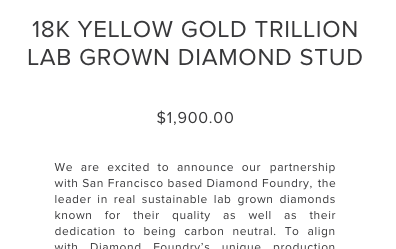
Two days ago, I said on Twitter that a press release on the new Jennifer Fisher collaboration with Diamond Foundry, which we wrote about here, as well as a related blog post on the Diamond Foundry site, didn’t seem to have much mention of the diamonds’ origins. The release, for instance, referred to Diamond Foundry as “America’s leading producer of diamonds.” (To be fair, the blog is housed on the Foundry site and does link to a Vogue article that included the info in the headline.)
A since-changed Jennifer Fisher consumer-facing page, which can be seen archived here, contained similar language. It listed one piece as an “18K yellow gold emerald cut diamond solitaire.”’

Jewelers Vigilance Committee president and CEO Tiffany Stevens says that the FTC Guides require that, if someone is selling man-made diamonds, they can’t use the word diamond without a modifier.
“You always have to qualify the word diamond with one of the approved descriptors when you use the word,” she says. “If it’s just diamond alone, that means natural.”
Her group ended up reaching out to the company.
“We feel as existing jewelers get into this new space it’s a chance for education,” she adds. “We don’t think [Jennifer Fisher] is being flagrant, and we look forward to having the opportunity to educate the folks writing and approving the advertising copy about the details of the FTC regs that apply. We’re here to help.”
For the record, here is the relevant FTC regulation:
(b) It is unfair or deceptive to use the word “ruby,” “sapphire,” “emerald,” “topaz,” or the name of any other precious or semi-precious stone, or the word “stone,” “birthstone,” “gemstone,” or similar term to describe a laboratory-grown, laboratory-created, [manufacturer name]-created, synthetic, imitation, or simulated stone, unless such word or name is immediately preceded with equal conspicuousness by the word “laboratory-grown,” “laboratory-created,” “[manufacturer name]-created,” “synthetic,” or by the word “imitation” or “simulated,” so as to disclose clearly the nature of the product and the fact it is not a natural gemstone. [Emphasis added]
The Jennifer Fisher page has now been changed, as you can see below.

“We had a chance to chat yesterday,” says Stevens. “[The site] looks much better.”
Two Jennifer Fisher spokespeople didn’t return a reply for comment, but Foundry CEO Martin Roscheisen tells JCK the whole thing is a nonissue.
“[Diamond Foundry’s] legal understanding is nuanced and informed by real legal advice,” he says. “We are in full and complete compliance with the law according to the country’s best FTC attorneys. This whole thing is a rehash of the same topic two years ago.
“We do not want anyone to think ours are mined diamonds,” he adds, noting it’s created a video about its process.
When asked his opinion on the FTC Guides, he says, “They were written by monopolist lobbyists and are anticompetitive in parts today. You can quote me on that.”
Okay. I just did.
One more point on the broader subject: We sometimes get the question of whether the Guides are akin to laws and whether they can be enforced. The answer seems to be yes and no. Here is what the Commission itself has to say on the matter (see footnote 2, page 1)
The Commission issues industry guides to help the industry act in conformity with legal requirements. Industry guides are administrative interpretations of the law; they do not have the force of law and are not independently enforceable. Failure to follow industry guides may result, however, in enforcement action under the FTC Act, 15 U.S.C. §45. In any such action, the Commission must prove that the act or practice at issue is unfair or deceptive in violation of Section 5 of the FTC Act.
(Top image courtesy of Jennifer Fisher)
- Subscribe to the JCK News Daily
- Subscribe to the JCK Special Report
- Follow JCK on Instagram: @jckmagazine
- Follow JCK on X: @jckmagazine
- Follow JCK on Facebook: @jckmagazine